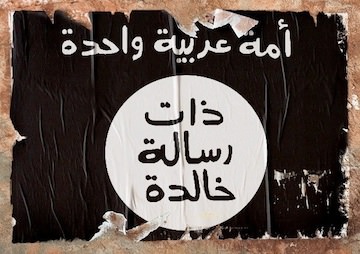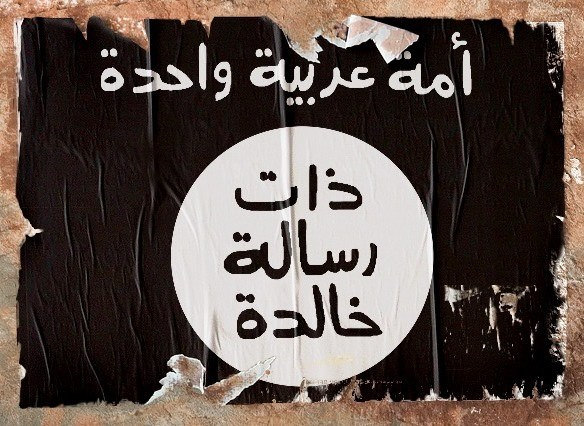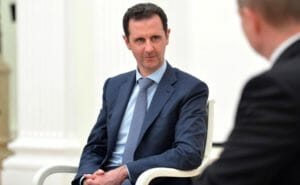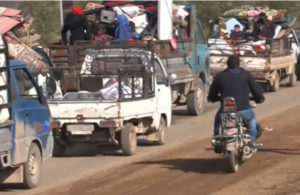The Aleppo Strategy Against Islamic State: Can It Work?
The Washington Post was the first to broach the issue of Russo-Iranian grand strategy in Syria.

The flag of the self-proclaimed Islamic State. (3aref 6ari2o / CC BY-SA 2.0)
This post originally ran on Juan Cole’s website.
The Washington Post was the first to broach the issue of Russo-Iranian grand strategy in Syria. It turns out that an Iraqi Shiite militia leader Bashar al-Sa`id, told WaPo that he thinks the road to Mosul runs through Aleppo.
I am always suspicious of the assertion that “the road to x lies through y.” The Neoconservatives informed us that the road to peace in Jerusalem lay through Baghdad. Now neither one has peace.
As Alarabiya notes that it is hard to see how taking Mosul back would have an impact on Daesh (ISIS, ISIL). Aside from a few villages in its hinterland, Daesh has had little to do with Aleppo.
MILITARY SITUATION #MAP
March, 4 2015
#Hasakah
#Kobane
#Rojava
#Raqqa
#Aleppo
#Mosul
#Erbil
#InherentResolve
#YPG pic.twitter.com/i6vBkGSLqq
— Jiyane (@Papilionidae_77) March 6, 2015
So why is an Aleppo campaign against Daesh more appealing at this point to the Shiite militias of Iraq than a Mosul campaign? As noted, Daesh has little presence in Aleppo, so the assertion of such a campaign itself is confusing.
What is actually going on here is that the US military is advising the government of Iraqi prime minister Haydar al-Abadi against an imminent Mosul campaign. The US thinks a conquest of Mosul by Shiite militias would look terrible. So they want to wait until they can get at least some Sunni tribal buy-in. Many Iraqi Shiite militias believe it is unwise to simply wait out the phony caliph, Abu Bakr al-Baghdadi, and want to take action now.
There is nothing to stop, however, an Aleppo campaign. East Aleppo is held by the Army of Conquest coalition that includes al-Qaeda and the hard line Salafi Freemen of Syria (Ahrar al-Sham), as well as by a separate coalition of remnants of the Free Syrian Army that decline to join the operations bureau set up by the Army of Conquest. Some of the northern hinterland is held by the PYD Kurds.
Government forces still hold the west of the city. And here is another set of differences with Iraq. Although it has experienced incredible rates of desertion and many setbacks, the Syrian Arab Army is still standing. Unlike its Iraqi counterpart, it hasn’t collapsed.
So there is an army partner for an assault on Aleppo, unlike in Iraq’s Mosul, where the heavy lifting would have be done by the Shiite militias. Likewise, in Syria substantial proportions of the urban Sunni population are supporting or complacent toward the regime, unlike in Iraq where Sunni support for the ruling Da’wa Party is slim to none.
Will reestablishing Syrian regime control over most of Aleppo help defeat Daesh in Mosul? No.
Moreover, nothing has changed on the ground such that the regime would be able to go on holding Aleppo were al-Assad’s minions to take it back with Lebanese, Iraqi, Iranian and Russian aid. The problem for Bashar al-Assad is that he just does not have the biopower to hold more than about 60% of the Syrian population, and what he holds has been slipping.
So even if the Aleppo campaign goes well for the Russians and the regime, it is unlikely to go well in the medium to long term. And, it has nothing to do with Mosul, at all.
Independent journalism is under threat and overshadowed by heavily funded mainstream media.
You can help level the playing field. Become a member.
Your tax-deductible contribution keeps us digging beneath the headlines to give you thought-provoking, investigative reporting and analysis that unearths what's really happening- without compromise.
Give today to support our courageous, independent journalists.



You need to be a supporter to comment.
There are currently no responses to this article.
Be the first to respond.